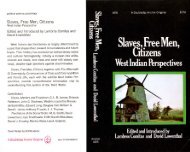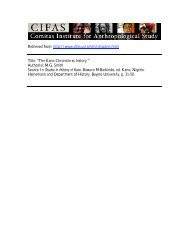e - CIFAS
e - CIFAS
e - CIFAS
You also want an ePaper? Increase the reach of your titles
YUMPU automatically turns print PDFs into web optimized ePapers that Google loves.
,. GOVERNMENT IN ZAZZAU GOVERNMENT IN NINETEENTH_CENTURY AHUJA 53<br />
society, and in their hierarchies and relations they mirror the<br />
composition and values of the wider unit.<br />
(c) Social Status and the Official Sysum<br />
In view ofthis, it is necessary to consider the nature ofthe basic<br />
status differences and conditions current in Habe society. Apart<br />
from the king, his family, and other members ofthe royal lineage,<br />
there were hereditary vassal chiefs, and freemen who were divisible<br />
into officials, aristocrats not holding office, mallams or religious<br />
leaders, manumitted slaves, and freeborn commoners. The society<br />
also containedslaves and eunuchs, together with subordinate pagan<br />
populations which were culturally and linguistically distinct. Of<br />
the major status-groups, the category of free persons showed the<br />
highest degree of internal differentiation. Thus, to consider only<br />
office-holders, among free persons, the Sarkin Gayen, a former<br />
Habe village chief, was noble by descent as well as office, while<br />
all others. although holding important titles such as Madawaki<br />
or Sarkin Fada, might have risen from the commoner class<br />
(talakawa). The religious order ofmallams,. who were all freemen,<br />
embodied another principle of differentiation within the statusgroup<br />
of free persons. Moreover, as M. Hassan's ethnography of<br />
Abuja indicates, occupational differences had Significant status<br />
implications for the free commoners. Butchers, for example, were<br />
accorded very low status.<br />
These statuses differ significantly according to their social implications,<br />
mutability, and modes of differentiation. Thus slavery<br />
was a legal status, terminable for both sexes by manumission,<br />
purchase of freedom, or death, and also, for females, by bearing a<br />
child for their master as his concubine. Freedom was also a mutable<br />
legal status, since capture normally led to death or enslavement<br />
in another society. In contrast, the status ofeunuch was immutable,<br />
wherever the individual might be, and irrespective of<br />
captivity. The eunuch's condition rendered the question of his<br />
freedom or slavery meaningless, since he was unable to marry or<br />
beget issue, and so had no family to succeed or inherit from him.<br />
The eunuch's dependence on his master was thus variable, according<br />
to the facilities which he enjoyed.<br />
Among free officials also, it seems clear that very few titles were<br />
held on a life-tenure basis, while none were hereditary, except for<br />
the royal offices, the vassal chieftainships and the title of Sarkin<br />
Gayen. Officials were in theory subject to dismissal as well as<br />
promotion after their appointments. There were also occasions on<br />
whi.ch persons ?f. a particular status exercised rights and powers<br />
typIcally the prlVllege of other statuses. Thus the religious order<br />
of mallama, which enjoyed high prestige as a non-political group,<br />
was charged with the political function of selecting the successor<br />
to the throne.<br />
Within the royal lineage, and even within the king's family<br />
individual status remained alterable through death and succession:<br />
and varied according to the specific relation holding between the<br />
king and different persons. Significantly, the Dan Galadima orheir<br />
apparent rarely succeeded to the throne; and the administrative<br />
n:spons~ilities or authority of the various royal officials further<br />
differentiated between them; thus neither theheir presumptive nor<br />
the Magajin Dangi (head of the----royal?-lineage) are reported to<br />
have controlled fiefs, although the king's eldest daughter. the<br />
Sarauniya, is said to have done so. Whether this reflects an<br />
omissionin the aCCOunt or corresponds to the original allocation of<br />
duties cannot be said.<br />
. The precise definitions of rank-orders, their peculiar compositIO~,<br />
interrelations, hierarchic structure and arrangement in a<br />
,:anety o~ closed promotional series gain new significance by relation<br />
to this background ofsocial differentiation. Only by some such<br />
system of precise and predictable relations was it possible to<br />
_ organize the participation of persons of such varied statuses<br />
_ smoothly and continuously within the system of government; and<br />
only through the participation of persons ofthese different Status<br />
, groups could the personnel of government sufficiently reflect the<br />
differentiation of the society, to evoke popular consensus and support,<br />
The differentiation of official roles within the government,.<br />
and the p~lar allocatioJLS of office to different status-groups<br />
,were functIonally related, and between them ensured that the<br />
; social composition and structure of government corresponded to<br />
that of the society.<br />
Allocation of three out of the four rukuni offices to eunuchs is<br />
noteworthy in two respects. Firstly eunuchs were the only group<br />
, \Vhose status was immutable. Secondly such allocations served to<br />
. protect the system of government against change. These two fea<br />
"ttues are closely related. As eunuchs, such high officials could not<br />
"entertain personal ambitions ofa type inconsistent with the current<br />
0.z·-5





